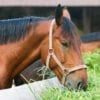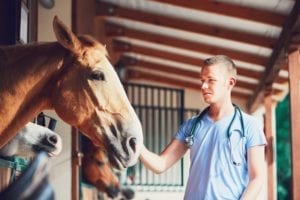As with any living creatures, horses are susceptible to sicknesses. This is especially true during the summer months when your horse is doing lots of traveling to shows. The downside of these shows is the exposure to other horses who could be sick. When horses are returning to their homes all over the country, sicknesses can quickly spread across many states. However, there are steps you can take to help keep your horse healthy. It is always a good idea to have a quick trip to the veterinarian’s office following shows and the stresses of traveling.
While sickness isn’t always preventable, there are a number of things that can be done to ensure the strength of your horse’s immune system.
 Providing Regular Veterinary Care for Your Horse
Providing Regular Veterinary Care for Your Horse
Whether your horse is competing, training, or just riding the trails, the basic veterinary needs should always be met. As with any animal, a veterinarian should perform an annual physical on your horse, inspecting oral health, updating vaccinations, providing deworming, and checking overall health. These basic needs can really help to keep your horse’s immune system strong and healthy.
Horse Vaccinations:
Having your horse vaccinated is one of the best things you can do to protect it from diseases. Insect populations are high during the summer and can quickly spread diseases to your horses. Fortunately, there are vaccine boosters available to boost your horse’s immune system. These vaccines can help to ward off West Nile Virus and Equine Encephalomyelitis.
If your horse is traveling a lot this summer to shows, consider a booster vaccination to help prevent equine influenza virus and equine herpes virus. These vaccinations serve as your horse’s first line of defense.
Horse Deworming:
Because many types of parasites live off the food that horses eat, it’s common for them to develop a parasite problem. To maintain your horse’s health and a strong immune system, you must have a constant deworming schedule to keep them parasite-free. If infected, they could suffer weight loss and may even experience colic.
For effective deworming, you need the proper doses given at the right times. It is best for you to consult with your veterinarian that can put your horse on a deworming schedule.
Steps You Can Take to Protect Your Horse
Don’t Share Equipment:
There are basic steps you can take as a horse owner to help keep your horse companions healthy. You can monitor and help prevent the spread of disease from one horse to another. We recommend designating equipment for each horse. Avoid sharing lead lines, halters, and regularly clean your equipment and horse stalls. In addition to keeping the stalls clean, always practice good hygiene and cleanliness.
Isolate New Horses:
Keep new or returning horses separated from the rest of the herd for at least 2 weeks. Check the temperature of the horses daily to ensure they are healthy. This can help you isolate any disease, preventing the spread of sickness to your other horses. If you do see a rise in the horse’s temperature, contact your veterinarian.
Nutrition & Exercise For Your Horse
Just like people, a high-quality diet and fitness level is a good indicator of a healthy horse. Feed your horse a healthy diet and include supplements if necessary to help them stay in good health.
During your travels, training, and competitions, take precautions to reduce stress that could compromise a horses immune system. Furthermore, be aware of insects and the extreme heat during the summer that brings additional risks. By taking the necessary steps and preventative measures while practicing good hygiene, you can help keep your horse happy and healthy.
Looking to adopt a horse, consider providing a forever home to one of our horse rescues. Contact us for more information on adopting a horse.








